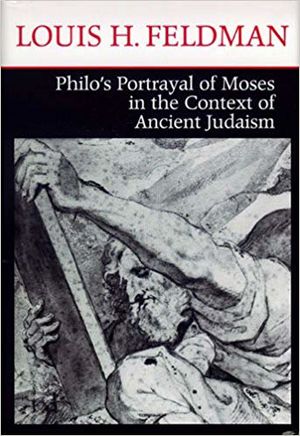Philo's Portrayal of Moses in the Context of Ancient Judaism (2007 Feldman), book
Philo's Portrayal of Moses in the Context of Ancient Judaism (2007) is a book by Louis H. Feldman.
Abstract
"Philo's Portrayal of Moses in the Context of Ancient Judaism presents the most comprehensive study of Philo's De Vita Mosis that exists in any language. Feldman, well known for his work on Josephus and ancient Judaism, here paves new ground using rabbinic material with philological precision to illuminate important parallels and differences between Philo's writing on Moses and rabbinic literature. One way in which Hellenistic culture marginalized Judaism was by exposing the apparent defects in Moses' life and character. Philo's De vita Mosis is a counterattack to these charges and is a vital piece of his attempt to reconcile Judaism and Hellenism. Feldman rigorously examines the text and shows how Philo presents an aretalogy similar to that of a mythical divine and heroic figure, by glorifying the birth, education, and virtues of Moses. Feldman demonstrates that Philo is careful to explain in a scientific way those portions of the Bible, particularly miracles, that appear incredible to his skeptical Hellenistic readers. Through Feldman's careful analysis, Moses emerges as unique among ancient lawgivers. Philo's Portrayal of Moses in the Context of Ancient Judaism mirrors the organization of Philo's biography of Moses, which is in two books, the first, in the style of Plutarch, proceeding chronologically, and the second, in the style of Suetonius, arranged topically. Feldman's book discusses the life of Moses chronologically and in the third chapter examines his virtues topically. Feldman compares the particular features of Philo's portrait of Moses with the way in which Moses is viewed both by Jewish sources in antiquity (including Pseudo-Philo; Josephus; Graeco-Jewish historians, poets, and philosophers; and in the Apocrypha, Pseudepigrapha, Samaritan tradition, Dead Sea Scrolls, and rabbinic tradition) and by non-Jewish sources, notably the Greek and Roman writers who mention him."--Publisher description.
Editions
Published in Notre Dame, IN: University of Notre Dame Press, 2007 (Christianity and Judaism in Antiquity Series, 15).
Contents
I. General considerations -- The importance of Moses in classical antiquity -- The antiquity of Moses -- Philo's audience in De Vita Mosis -- Philo's life of Moses as an Aretalogy and as an Encomium -- Philo's method as a Biographer of Moses -- Philo's knowledge of oral tradition -- Philo as Midrashist -- II. The life of Moses -- Moses' genealogy -- Moses' birth -- Moses' upbringing -- Moses' handsomeness -- Moses' attitude toward wealth -- Moses's career as leader of the Israelites -- Moses before his departure for Midian -- Moses in Midian -- The burning bush -- Moses' return to Egypt -- The plagues -- The Israelites' departure from Egypt -- Moses' leadership during the Exodus: the miraculous crossing of the Sea of Reeds -- Moses' leadership in the wilderness -- War with the Amalekites -- The omission of Jethro's visit -- The revelation at Sinai -- The golden calf -- The case of the blasphemer -- The second passover -- The spies -- The revolt of Korah -- The war with the Edomites -- The war with Sihon -- Balaam -- The incident with the Midianite Women and Phinehas -- The choice of a successor: Joshua -- The battle against Midian -- The proposal of Reuben and Gad -- The daughters of Zelophehad -- The death of Moses -- The extraordinary deaths of extraordinary persons -- Attacks on Biblical accounts as myths -- The account of Moses' death according to the assumption of Moses -- Philo's description of Moses' last days -- Pseudo-Philo's account of Moses' death -- Josephus' account of Moses' death -- The Rabbinic account of Moses' death -- The Samaritan description of Moses death -- III. The virtues of Moses -- In general -- Wisdom -- Courage -- Temperance -- Justice -- Piety -- Moses as Lawgiver -- Moses as King -- Moses as Sufferer -- Moses as Priest and Theologian -- Moses as Prophet -- The reference to a prophet like Moses -- Moses as Mediator -- Moses as Philosopher and Inventor -- Moses as Performer of Miracles -- Moses as Magician -- Moses as Messiah and the return of Moses -- The divinity of Moses -- The term "G-d" as applied to humans in the Hellenistic and Roman Periods -- The attitude of the Apocrypha and Pseudepigrapha to the divinity of Moses -- The deification of Moses according to (generally regarded) Graeco-Jewish writers -- The alleged deification of Moses in the Dead Sea Scrolls -- The association of Moses with divinity in the New Testament -- Philo's view of the alleged divinity of Moses -- The alleged deification of Moses in Pseudo-Philo -- Josephus' view of Moses' alleged divinity -- The divinity of Moses in the Rabbinic Tradition -- The alleged divinity of Moses in the Samaritan Tradition -- IV. Conclusion -- Index of Ancient Texts -- Jewish Scriptures -- Apocrypha -- Pseudepigrapha -- Dead Sea Scrolls -- New Testament -- Church Fathers -- Samaritan Writings -- Philo -- Pseudo-Philo -- Josephus -- Other (alleged) Graeco-Jewish Writers -- Rabbinic and Allied Literature -- Classical Greek Authors -- Classical Latin Authors -- Papyri.
External links
- [ Google Books]
